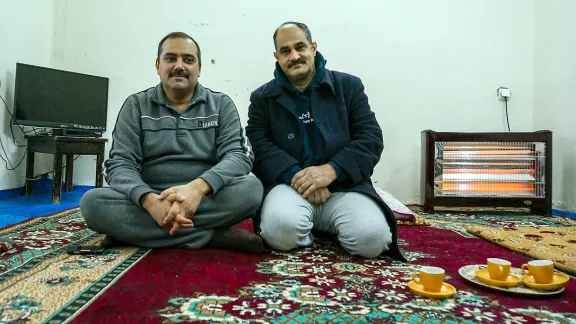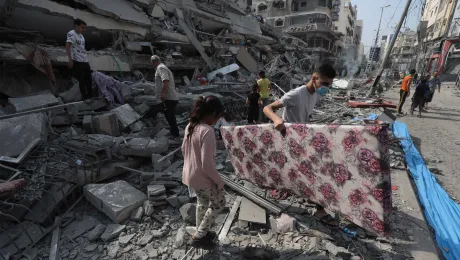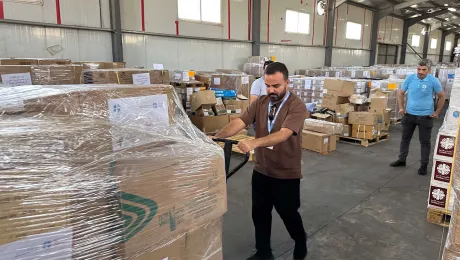
Dr H. and his neighbour. Both men have taken shelter with their families in Kurdistan where a LWF partner operates a mobile health clinic. Photo: LWF/S. Cox
Focus on Freedom of Religion or Belief in Iraq
(LWI) - The right to freely and openly practice religion without fear of persecution is as fundamental as those rights guaranteeing a person’s physical needs.
Yet, many Christians, Yazidis and Sunni Muslims in regions held by Islamic State will spend world Human Rights Day, December 10, in fear of their lives.
Father Emmanuel Youkhana, director of the Lutheran World Federation’s partner in Northern Iraq, CAPNI, has witnessed years of persecution against his Assyrian people, who are Christian. Many of them want to migrate.
“Throughout history, non-Muslims have suffered in this region and still don’t feel confident they are considered partners,” he says.
History of Persecution
It is not the first time Christians have fled Mosul, Father Emmanuel says. “But this time they were betrayed by their neighbours. Co-existence has broken down.” He explains that Assyrians while helpless are not hopeless. “But hope needs to be empowered. Emotions are not enough.”
Father Emmanual still holds on to hope for a land in which freedom of religion and belief is the norm.
“I dream that the long-term future of the Ninevah Plain will be a model of peaceful co-existence. But as long as people feel they do not enjoy the same rights as any citizen in the country, it will not happen.” Only patience and the guarantee of protection to all will instil the confidence needed to bring about a future that protects citizens, regardless of their religious belief, he says.
Being “people of the book”, a reference to non-Muslim adherents to faiths which have a revealed scripture, the Christian Yazidis would normally enjoy a special protection in Islam. Yet misinformation about their beliefs left them subject to a particularly harsh treatment at the hands of Islamic State. They have suffered summary execution, kidnapping and rape.
Yet, Sunni Muslims are viewed with fear and suspicion in some quarters, too.
Dr H. was the last to leave his post at Tikrit Hospital as Islamic State terrorised the city and clashed with the Iraqi army. He had long ago gone beyond his mandate. A specialist in internal medicine, he struggled to cope with the deluge of seriously injured patients by carrying out surgical procedures while airstrikes and vehicle explosions wracked his city. When his emergency unit was bombed and the hospital ran out of medicine, he listened to the pleas of his neighbour, a former senior military, to protect his family and leave.
Targeted for Being a Sunni Muslim
“I was targeted by the Iraqi army for being Sunni. They regarded us as Islamic State opponents. It wasn’t until my neighbour called and said that I must get out that we left. But it was hard because I still wanted to help the people” he says.
On his way out of the city, he was questioned at three Islamic State checkpoints about his motive for leaving. “They asked me, ‘Why do you want to leave the hospital?’”
Fortunately neither his name nor his vehicle registration appeared on the database used by Islamic State insurgents manning checkpoints. Ironically, being a Muslim he was almost denied entry at the checkpoints bordering the Kurdistan region. The same faith which had caused his persecution to begin with almost denied him safety. It was only because he could phone a friend to vouch for him that he was not turned back.
He now lives in a modest house with his wife and two young children in a small village in Kurdistan, which is home to the oldest surviving church not destroyed by the Saddam Hussein regime. Both Dr H. and his neighbour have some peace in this place.
“This is not our life but what can we do? At least here, there is no division. My neighbours are a Christian family from Mosul. We live very harmoniously. Relations between us are really good. We treat all people as we would like to be treated” the doctor says.
Ask anyone who has fled the terror of Islamic State a simple question: what would you most like? They will answer: the right to remain in my country of religious heritage, to live in peace, to worship where and as one wishes with their fellow people of faith – hence: our human rights”
LWF Council Statements
At their 2014 meeting, the LWF Council adopted a public statement on “Welcoming the Stranger”, calling for compassion and understanding to refugees and migrants. “It is part of our duty to act with love toward those in need, regardless of their religion, gender or nationality”, the statement says.
The LWF Department for World Service is assisting the people displaced by IS terror in Dohuk and the Nineveh plain. LWF is providing shelter, water and sanitation as well as non-food items such as blankets, mattresses and cooking equipment. LWF is also actively rehabilitating schools where refugees had been sheltered during the summer.
In cooperation with the Kirkuk center for torture victims Jiyan, LWF gives psychosocial support. A special focus currently lies on preparing the people for winter and distributing winter clothing and heaters.


